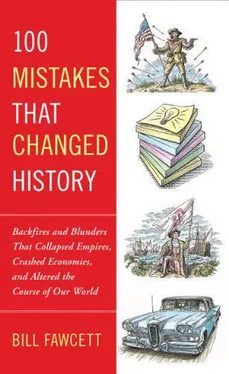By the time Scipio had re-formed and moved his maniples to attack Hannibal’s veterans, the fugitives who had survived from the broken two-thirds of the Carthaginian army had either died or escaped around the edges of the final line. From having a numerical advantage in infantry of four to three, the odds against Hannibal had now changed to a disadvantage of two to one as his 15,000 veterans attempted to defeat more than 30,000 legionnaires. And for a time they held, fighting off twice their number and not even being pushed back. But then the Romans’ two victorious cavalry forces returned to the battlefield. Both slammed into the back of those Carthaginian veterans. Surrounded and outnumbered, the last and best of Hannibal’s army died. Hannibal himself fled into Carthage and then into permanent exile.
Scipio, soon to be known as Africanus in honor of his victory, approached the walls of Carthage, but lacked siege artillery. He could besiege the city, but that would take months and the Senate was likely to call him back anytime. So again he offered terms, though not as generous as those he had been willing to give a few days before. Now Carthage did not have a single army left. The oligarchy that ruled Carthage had no real choice but to accept. Among these terms was the provision that Carthage could never again wage war without the Roman Senate’s permission. The peace agreement guaranteed that the city survived but also ensured Carthage could not rise again to greatness or be a threat to Rome. They ignored a basic rule of diplomacy that is all too often ignored: If you have everything to lose and winning will not win the war, accept any peace you can get.
Having lost two wars to Rome, the merchant princes of Carthage should have known better. But less than fifty years later, the city hired another army of mercenaries and attacked a Roman ally in Africa—an ally that they felt had betrayed the city. Rome’s reaction was not only to conquer the city but effectively to eliminate it. Although it was one of the most successful merchant cities in history, Carthage never seemed to realize that it had a good deal when it really mattered.
Had Carthage survived as a major economic presence in the Mediterranean, the city might well have slowed or changed the expansion of Rome. Certainly its mercantile philosophy and family-centered social structure would have been more present in today’s Western culture as opposed to the patriotic and state-centered ideal that we have all inherited from Rome.
Political Suicide
133 BCE
Tiberius Gracchus was born with just about as noble a pedigree as a Roman could. The Gracchi were an old and wealthy family. His grandfather was Publius Cornelius Scipio Africanus, the Punic War hero who finally defeated Hannibal Barca. He was married to another blue-blooded noble, Aemilia Pulcher, and the future looked good for young Tiberius Gracchus.
In 137 BCE, the young noble was appointed quaester, chief quartermaster and financial officer, for his brother-in-law, Scipio Aemilianus, in a campaign in Hispania (Spain). The war did not go well, and the entire Roman army was trapped. With his brother-in-law dead, Tiberius took charge and managed to negotiate a peace treaty with the local tribes that saved the lives of thousands of skilled Roman legionnaires. But rather than praising his efforts, many Senators condemned Gracchus, and the body even voted to nullify the treaty. It was the beginning of a battle between Gracchus and the Roman Senate that changed, and damaged, the empire forever.
Feeling alienated from the nobles who controlled Rome’s Senate, Tiberius Gracchus turned to the common people. What he saw angered him. For years the noble families had been grabbing up all the small farms. Often these were the farms of soldiers who were serving in the empire’s wars of conquest. With no male to work the land, many went into debt or were unable to pay the rising taxes. Then the farms were snatched up by the nobles, many of them Senators, and the people became slave labor to work the estates. This meant that when a soldier returned from the wars he would likely find himself and his family homeless and destitute. These penniless and unemployed former soldiers then flocked into the cities, especially Rome, hoping for work.
So in 133 BCE, a bitter and idealistic Tiberius Gracchus campaigned for and was elected to one of the two positions of tribune of the people. It was his job to represent the needs of the people to the Senate. He immediately began agitating for land reform. He tried to limit the amount of land any one person or family could hold. The attempt failed since there was simply no one to tell the Senators they could not acquire more land for themselves. He then called for all newly captured lands and any confiscated lands to be divided up between the former farmers. This, he explained, would both provide a living for the urban poor and create a pool of landowning farmers who could serve in the legions. It was a good idea, for the farmers and Rome, but not for the rich families controlling the empire.
The Senate refused to act on the proposed laws. On a personal level, the enmity between Gracchus, who constantly harangued for the lower classes in Rome and stirred them up, and the Senators, who benefited from the status quo, became vicious. When the Senators managed to pressure the other people’s tribune, Marcus Octavius, into vetoing the land reforms, Gracchus first forced his fellow tribune out of office, illegally, in most scholars’ opinions. Then he used his power, as the person who officially opened the temples and markets, to shut down the city. With what was effectively a strike supported by the people, Rome ground to a halt. Vital services were not maintained, and the food supply dwindled. Riots threatened, and the masses were angry.
The Senate reluctantly accepted the changes in the land laws and appointed an Agrarian Reform Commission to implement the new laws. Then they gave that commission a budget so low it could not actually do anything. It seemed a beautifully bureaucratic way to kill changes that would cost the Senator’s families a fortune. That ploy worked for a while until one of the client kings, Attalus III of Pergamum, died and left his kingdom and large personal fortune to Rome. Forcing leaders to do this was one of the main ways the empire took direct control of an area without having to conquer it. It was not an unusual bequest, but then Gracchus hijacked it. Against all law and precedent, because he felt the greater good required it, the tribune used Attalus’ fortune to implement his land reforms. The real problem for the Senate was not the loss of land or the illegal actions of the remaining tribune. What frightened them was that Gracchus then had a large and fanatic following among the common people. He had enough of a following to gain more control of the city of Rome than the Senators. Furthermore, he continued ranting against the Senate, declaring that it was acting only in self-interest.
There was a very real chance that Tiberius Gracchus could use the mobs of Rome combined with the reluctance of the legions to intervene against their fellow citizens to make himself dictator. Effectively, he already controlled most of the city through the mobs. Soon rumors were heard of Gracchus being seen wearing purple robes, such as the old kings had worn before the Senate replaced them. But the Senate had found a way to deal with the upstart tribune within the system. He had clearly broken the law in driving out Octavius so he could override the veto of the land reforms. As Gracchus’ one-year term as tribune (yes, just one year; he had been busy) ended, the young populist announced he planned to run for reelection. This was an unusual but not unprecedented event.
Читать дальше












